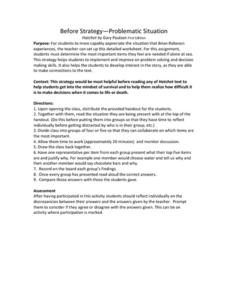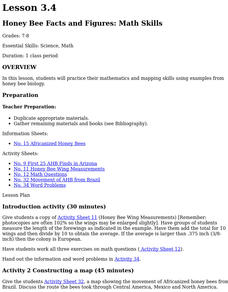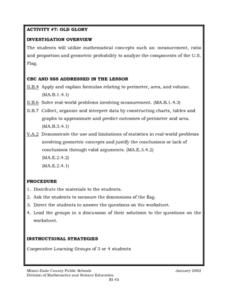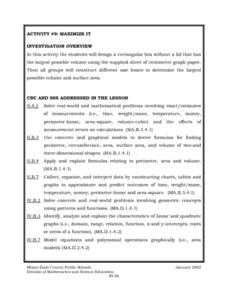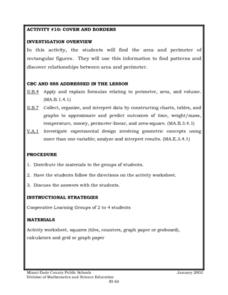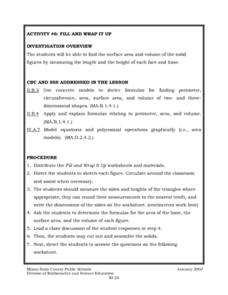Discovery Education
Sonar & Echolocation
A well-designed, comprehensive, and attractive slide show supports direct instruction on how sonar and echolocation work. Contained within the slides are links to interactive websites and instructions for using apps on a mobile device to...
Curated OER
Wild and Wetlands
Upper graders identify the major characteristics of a wetland. They explore the human factors that change a wetland and write a descriptive paragraph about wetlands. This comprehensive lesson also has an interactive "Watershed Game"...
EngageNY
Polynomial, Rational, and Radical Relationships
This assessment pair goes way beyond simple graphing, factoring and solving polynomial equations, really forcing learners to investigate the math ideas behind the calculations. Short and to-the-point questions build on one another,...
EngageNY
Complex Numbers and Transformations
Your learners combine their knowledge of real and imaginary numbers and matrices in an activity containing thirty lessons, two assessments (mid-module and end module), and their corresponding rubrics. Centered on complex numbers and...
Curated OER
Nonfiction Genre Mini-Unit: Persuasive Writing
Should primary graders have their own computers? Should animals be kept in captivity? Young writers learn how to develop and support a claim in this short unit on persuasive writing.
Noyce Foundation
Cereal
Find the best protein-packed cereal. The short assessment task covers equivalent and comparing ratios within a context. Pupils determine the cereal with the highest ratio of protein. A rubric helps teachers with point allotments for...
National Research Center for Career and Technical Education
Photoshop Scale
Say cheese! Can your class take a great photo and size it to fit any need? A career and technology-centered lesson plan demonstrates the correct way to resize images in Adobe Photoshop. Scholars view a presentation and work individually...
Laboratory for Atmospheric and Space Physics
Charting the Progress of New Horizons
In 2006, New Horizons began its mission to fly to Pluto. As it continues its journey, scholars track its progress with the help of an informative website, all the while reinforcing measurement concepts with the construction of a scaled...
Curated OER
What's Next?
Teach the class how to continue a given number pattern, and have them state a rule to explain their answer. Arithmetic sequences and related worksheets are used to reinforce the concept of numerical patterns using the nthterm.
Curated OER
Hatchet: Before Strategy- Problematic Situation
If you were stranded on a desert island, what items would be the most important to have with you? Decide whether you'd want a five gallon can of water, a radio, shark repellent, or any other item with an activity designed to prepare kids...
Civil War Trust
Map the Civil War
Mapmaking was a very important element in successfully planning attacks on enemies during the Civil War. Guide pupils through the process of pacing to find the average length of their steps, measure the distance between one object to the...
LABScI
Kinematics: The Gravity Lab
Falling objects can be brutal if you don't protect your noodle! Scholars explore the motion of falling objects through measuring short intervals to determine if the distance traveled varies with time. Building off of this, scholars...
Channel Islands Film
Arlington Springs Man: Lesson Plan 3
Imagine being part of a team of scientists that discover the oldest human remains in North America. Imagine being part of the crew that documents this discovery. Class members get a change to be part of such an exciting adventure in a...
Curated OER
Relating Coins to Bills: Enrichment
In this fractions and money worksheet, students use the chart that lists coins, their values, and the fraction they represent in a dollar. Students then use the chart to answer the questions.
Curated OER
Dihybrid Punnett Squares
Students construct Punnett squares to illustrate specific genotypic and phenotypic genetic outcomes.
Students calculate the probability of achieving specific genotypic and phenotypic genetic oucomes, using dihybrid Punnett squares.
Curated OER
Making Connections, Linking Population and the Environment
Learners find out that all habitats have a carrying capacity. They explore how the world's human population has grown markedly in the 20th century, and that humans impact environmental health. Students investigate that people can and...
Curated OER
Honey Bee Facts And Figures: Math Skills
Learners practice their mathematics and mapping skills using examples from honey bee biology. Discuss why the colonies were found in this pattern. They examine food and water in the area, and how many humans live in the area where...
Curated OER
Old Glory
Learners utilize mathematical concepts such as: measurement, ratio and proportion and geometric probability to analyze the components of the U.S. Flag. They collect, organize and interpret data by constructing charts, tables and graphs...
Curated OER
Maximize It!
Students design a rectangular box without a lid that has the largest possible volume using the supplied sheet of centimeter graph paper. They work in groups to construct different size boxes to determine the largest possible volume and...
Curated OER
What is a Haiku? How Do You Write a Haiku?
Haiku poetry is explored in this language arts lesson. Yong readers identify the characteristics of haiku and read several examples. Students make connections between their study of Japan and the poetic form of haiku, and they write...
Curated OER
Cover and Boarders
Students find the area and perimeter of rectangular figures. They use this information to find patterns and discover relationships between area and perimeter. Students apply and explain formulas relating to perimeter, area, and volume.
Curated OER
Triangle Inequality
Students discover that the sum of the lengths of any two sides of a triangle must be greater than the third side. They are shown how a triangle is formed using three strips such as that the triangle is seen inside the strips.
Curated OER
Extreme Elevations
Seventh graders use highest and lowest points of land elevation around the world to find the differences. Sea level is zero, so students be operating with positive and negative numbers. After students find the information on the...
Curated OER
Fill and Wrap It Up
Students find the surface area and volume of the solid figures by measuring the length and the height of each face and base. They use concrete models to derive formulas for finding perimeter, circumference, area, surface area, and volume...











